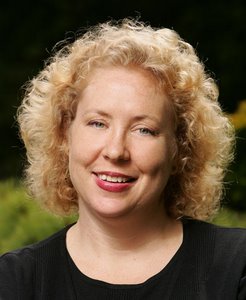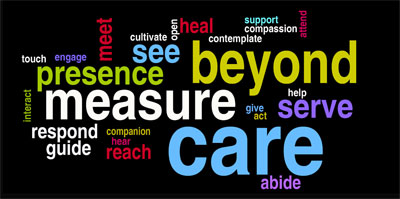The Beyond Measure School for Contemplative Care
The mission of Beyond Measure School for Contemplative Care is to foster awakening, dignity, and harmony in the twilight years of life through engagement with contemplative practices. Beyond Measure is a collaboration between Jennifer Block, the former Education Director at Zen Hospice Project, and the San Francisco Zen Center.
Ultimately, this program will inform the Zen-inspired senior living community currently being developed by SFZC and Northern California Presbyterian Homes and Services. This community will be a Continuing Care Retirement Community and will be open to all. “The Zen-inspired Senior Living Community we are developing has at its heart this contemplative care practice. All people will be trained in how to care for each other in this non-dual way. Without this training at its heart, it would just be a collection of beautiful buildings,” said Susan O’Connell, SFZC Vice President and associate director of Care Beyond Measure.
The school offers an upcoming June workshop (The Circle of Caregiver, Receiver, & Gift with special guest Dr. Grace Dammann) at Green Gulch Farm and, beginning in the fall, a yearlong certificate training, which engages individual, family, and professional caregivers in contemplative practices and care methods through 11 months of coursework.

Jennifer Block
In anticipation of these events, we sat down with Jennifer Block to find out more about the school, its mission, and the revolutionary partnership between Buddhist teachings and caregiving.
What was the inspiration behind the school for contemplative care?
Many years ago, SFZC discovered a natural connection with the compassion and wisdom they’d been cultivating on the cushion that could be immediately applied for caring for people who were sick. That was an incredible discovery which was not entirely surprising since the Buddha became the Buddha because of his encounters with aging, sickness, and dying. This was kind of what got him out of the palace and onto the spiritual path.
How did you find yourself on this path as an educator and caregiver?
Spiritual practice and service were the early roots for me. I joined Zen Hospice as a volunteer in 1998, where I specialized in end of life care. I trained with Frank Ostaseski and started teaching a course in Buddhist spiritual care at the Sati Center with Gil Frohnsdal and Paul Haller. Buddhists, through mindfulness practice, have a lot of skill in dealing with a great deal of suffering without jumping into solutions. We tend to give people a little more space to be where they are before we jump into anything. One of the most common complaints from people is that the medical system is dehumanized, and Buddhists can bring a lot of presence in a way that people feel encouraged, strengthened, even healed.
How is this school different than your other projects?
From Zen Hospice, I know how much people from all walks of life need training in reclaiming their own innate capacity to care for each other and how professionals crave non-clinical or a different model of care based on mutual benefit. We begin with our own relationship with death, grief, and loss before we talk about how to care for somebody else. So this is a very different starting point, and that’s what this training is about.
What is it about the Buddhist teachings that lend themselves to this work?
Mindfulness strengthens one’s ability to be with pain or lessens one’s fear of pain. Life is painful, the Buddha taught, but how we respond to the pain, how we hold the pain, can lessen it in the long run and also awaken us to our natural inherent good heart and equanimous mind. This is about a direct experience of whatever is happening. Of coming closer to it and not turning away. Because we live in a death denying society, this is a significant invitation. I’ve found it’s an opportunity for people that they need or are craving since institutionalization of care has disconnected us from some of our inherent abilities.
Why are we so accustomed to avoiding talking about death, dying, and grief?
Many of us are living outside our original communities – so we can feel like strangers to each other. A lot of mourners feel very isolated because people are nice but don’t know how to be present. They don’t come towards, they turn away. The Bodhisattva move is toward suffering, not away. In that moment, how can I move towards? How can I do that which feels like a reach but not an imposition?
Can you give an example of how to approach someone in mourning in a mindful way?
The question, “How are you doing?” can be perceived as evaluative. Compare that to “What’s it like for you today?” That says, I remember your loss, you’ve been on my mind, what’s your day like today? That frees the person to say, “I had a bad morning.” “What’s it like now” is a different question than, “How is it going?” After a training, people go home and hug their partners and say “I’m sorry, that doesn’t matter”… It reawakens us. That’s the gift of playing close attention – we wake up to the connection, the love, our place in the world, and what matters.
It’s about trying to be with the experience of death and not adding anything else. To help the person feel encouraged, guided, and access their own intuition. Our Zen training helps us put the medical inside a larger container of a humanist or relational view. I think meditative practice, the study of the way things are, helps us see the truth and remove some of this delusion. You have so much more choice when you’re not in the flow of the medical process.
The most important thing is to have a relationship to hold the grief process. And that’s what the Zen teachings do so beautifully, create a container to hold the changes and the loss of hope. That’s all we’re working on all the time, to say, “It’s like this,” without a lot of strife and discord. That’s the way to stay with the experience and not turn away. This person needs support in being met and seen where she is right now. So, everybody needs this training. Whether they come for a lecture, a day, or eight times over the course of a year, we’re building skill, we’re strengthening our capacity for contemplative practice.
Who might benefit from the courses taught by the school?
This is health care, not just end of life care. For instance, someone could come because they work in mental health services, cares for a disabled child, or cares for a parent with Alzheimer’s. They can be a professional or civilian. The skills, theory, and learning process are pretty much the same. Professionals have something to learn from civilians and vice versa, so that mix will be a wonderful factor, creating the feeling that we’re all in this together. We’ll be building relationships and opening this door as wide as we can make it. And it works because we all have this thing in common. We’re on our way to our deaths and we care about each other and it is our nature is to be connected. We are fulfilling our craving for community.
—
The first phase of Beyond Measure is a daylong workshop and a yearlong training launching in the fall. To find out more, contact Jennifer, attend an introductory workshop, and read more on the Beyond Measure website.











